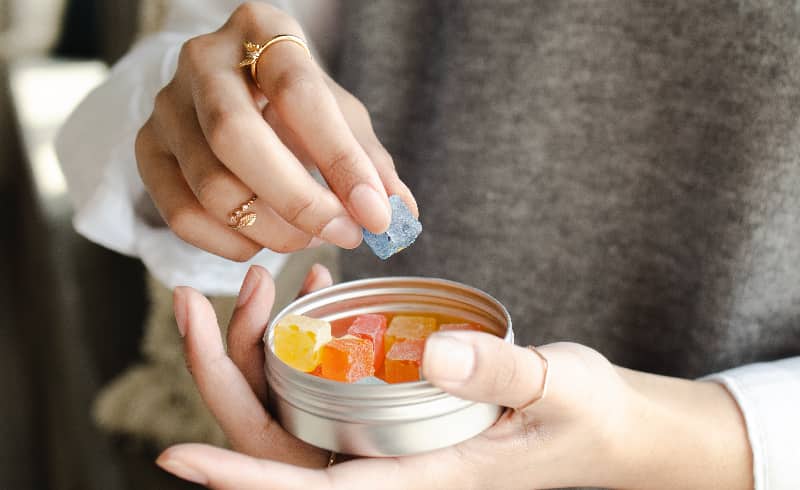Understanding how our bodies interact with substances such as edibles can bring us into a journey towards self-awareness, health, and recovery. It’s a question of metabolism, substances, and even overall wellness. Whatever reasons we may have, let’s find some answers to the question: how long do edibles stay in your system?
Understanding THC and its Journey through our System
To fully answer this question, it’s important to first understand THC—the active compound in marijuana. THC is interesting in its unique fat-soluble nature. Unlike many other substances that are water-soluble and eliminated from the body quickly, THC binds to fat cells—so they stay in your system longer.
Because of metabolism, the body’s interaction with THC doesn’t end the moment the high is gone. It keeps going until the last of the THC has been broken down, metabolized, and excreted.

There are lots of variables in play in the metabolization process. Factors such as body mass index (BMI), the individual’s metabolism rate, hydration levels, and frequency of use can influence how long THC remains detectable. A person with a higher BMI might metabolize THC more slowly due to a larger amount of fat cells, while someone with a faster metabolism might process THC more quickly.
Drug Tests for Understanding How Long Edibles Stay in Your System
When it comes to detection, drug tests look for metabolites—compounds created when the body breaks down THC. There are various types of drug tests, each with their unique windows of detection:
- Urine tests are the most common due to their cost-effectiveness and practicality. They can detect THC metabolites for anywhere between 3 to 30 days after consumption, depending on the frequency of use.
- Blood tests tend to have a shorter detection window, typically around 1 to 2 days. However, for chronic, heavy users, this window can extend up to a week.
- Saliva tests have a similar window to blood tests, typically detecting THC for 1 to 2 days.
- Hair tests, though less common because of cost, can reveal a much longer history of drug use, up to 90 days back. This is because metabolites are stored in the hair’s core, almost like a record of substance use over time.
Why It Matters
There are plenty of reasons to try to understand how long edibles stay in your system. Maybe it’s for a new job requiring a drug test, an athlete subject to substance screening, or simply someone curious about how their body works with the substances they uses.
Of course, beneath it all, is the reality of being ‘caught.’ And even more, it might signal a deeper issue of addiction. That said, the best reason to understand how long edibles stay in your system is not just for evading detection, but about confronting and addressing a potentially destructive pattern.
Embracing a Healthy Lifestyle
For too long, marijuana has been seen as non-addictive. However, the unfolding research in this field tells us otherwise – marijuana can, and does, lead to addiction.
Addiction, or Marijuana Use Disorder, isn’t a sign of weakness or a moral failing. Rather, it’s a complex interplay of genetic, environmental, and psychological factors. The consequences of this addiction can affect everything from physical health, mental well-being, relationships, and professional life.
An accredited marijuana rehab can provide substantial support in the journey towards recovery from marijuana addiction. Here’s how:
- Personalized Treatment Plans: Each individual’s journey with addiction is unique. Quality treatment centers provide personalized plans that consider your specific situation, including the severity of your addiction, your physical health, mental health, and personal preferences.
- Medical Detoxification: This process can help manage withdrawal symptoms under the supervision of medical professionals, ensuring safety and comfort.
- Counseling and Therapy: Therapeutic approaches for addiction treatment such as cognitive-behavioral therapy, motivational interviewing, and contingency management can help address the underlying issues that contribute to addiction and provide strategies to prevent relapse.
- Group Therapy and Peer Support: Connecting with others experiencing similar struggles can be incredibly powerful. It provides an understanding and supportive community where individuals can learn from one another’s experiences.
- Aftercare Planning: Treatment centers provide comprehensive aftercare plans to support ongoing recovery, helping individuals navigate life after treatment and manage potential triggers.
- Family Support Programs: Family involvement can be a significant part of the recovery process. EagleCrest offers family addiction support programs to educate loved ones about addiction and recovery, and how they can offer support.
- Mental Health Services: Many individuals with substance use disorders also have co-occurring mental health disorders. Treatment centers often provide integrated treatment plans to address both issues simultaneously.
When asking how long edibles stay in your system, the focus shouldn’t be only on evading drug tests, but rather on achieving an overarching sense of well-being and recovery from addiction.
Remember, it takes courage to face addiction, but the rewards of a healthier, happier life are beyond measure. And it’s a journey worth taking for oneself and for those we hold dear.
Reach Out for Help With Addiction
At EagleCrest, we believe that every person deserves the chance to reclaim their life from addiction. With our dedicated team of professionals, personalized treatment plans, and robust support system, we are here to guide you every step of the way on your road to recovery. Call us today: 844-439-7627.


